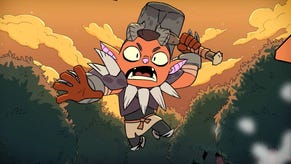Developers shooting the messenger: stop blaming the press for sexist extremism in games
The popular video games press is not responsible for gaming's enormous community problems, says Patrick Garratt, and developers proclaiming otherwise would do well to adjust their stances.
I’m sure it would be easy to argue that these events were worthy of coverage by the games press, and that other people are to blame for them. Pretending otherwise is at best misguided and at worst moronic. Either way, it’s definitely deplorable.
Never has the games community been more “us and them”. The last six months, beginning in earnest with the uncovering of developer Zoe Quinn's bedroom dalliance with Kotaku journalist Nathan Grayson and death threats made against Anita Sarkeesian, have been unparalleled in their chaos. We’ve seen a rise in vicious antagonism from pretty much every element of video gaming. We've had right-wingers against SJWs, feminists against sexists and Gamergate against common decency. We've seen a furious mélange of intimidation, pontification and navel-gazing so delicious in its violence and absurdity that it made the cover of the New York Times, the Colbert Report and has now been fictionally televised. Clowns to the left. Jokers to the right.
And it isn’t over yet! Today we have a new fight (because we all needed another one). Certain developers are now calling for more honesty and contrition from elements of the "yellow" gaming press. Video gaming websites did this, apparently. This petition, written by developer Mark Kern, holds Kotaku and Polygon completely responsible for a recent Law & Order SVU episode, titled “Intimidation Game”. This piece of television has, apparently, “set back the public image of the video games by years if not decades [sic].” It’s been signed by over 1,000 people.
I’ve been largely quiet on the subject of Gamergate (the term is never actually mentioned in the Law & Order episode, but it's the obvious inspiration). We’ve reported on related death threats because they're news, but we've largely left the editorial to others. Gamergate has almost nothing to do with the playing of video games, and is therefore usually irrelevant to our specific business. I've been vocal on Twitter about how much I abhor both the movement and its adherents, but, as a games site, we normally stick to writing about the games you play. That's how we pay the wages.
But I do want to say something about this petition and Ken Levine's favourable response to it (I'll come to that in a second).
Let's start with the petition itself. While it doesn't mention Gamergate specifically, Kern blames Kotaku and Polygon for the Law & Order episode based on their coverage of "a rift" (it's worth noting this tweet as clarity on Kern's position as regards Gamergate: he wants to "contribute," not "put words to your movement"): "This result, this episode, shown to millions of non-gamers worldwide is the inevitable result of months of gaming press coverage on the rift between gamers that currently plagues our hobby. A rift that the gaming press are accountable for conflagrating through a slew of articles that only served to fan the flames, celebrate the extremists on both sides, magnify the rift and sensationalize the issue."
Kern labels Polygon and Kotaku's approach to this "rift" as "yellow" journalism, and calls on the sites to, "Help us restore the damage that has been done. Help us stop this wasteful, self-defeating, sensationalist coverage that does nothing to solve our differences, but only serves to drive us apart."
He added that, "Sensationalistic, yellow journalism took an event and fanned the flames for clickbait," and that Kotaku and Polygon have constructed an "out of control narrative of hate and fear".
It's difficult to know where to start, but let's try to deconstruct this. Kern is saying that the reason the "rift" has made it into the non-gamer sphere is because of Kotaku and Polygon's reporting. While it's never clear in his document if there are any specific articles he particularly blames, or if it's just the entire body of Kotaku and Polygon's Gamergate coverage which is at fault, the "help" he's asking for appears to be in terms of stopping their reporting in relation to this story. I'm guessing: Kern never says what he's actually asking for.
I’ve read the petition through several times, and I still have no real idea what it is he actually wants apart from "help" to "heal" the damage the press has caused. It’s like gamers and reviewers telling developers they want first-person shooters to be “better," the reality being they have no clue what they'd like to see changed until they play the next big thing. Based on his petition, Kern is obviously dissatisfied with Kotaku and Polygon's coverage of the "rift," but what he feels needs to change simply isn’t detailed.
Also, and this is incredible, Kern seems to be saying that Kotaku and Polygon are wholly responsible for the making of the Law & Order SVU's Intimidation Game episode (he's even changed the wording at, of course, the request of the public, to be less "civil" towards the sites). You can read an overview of the episode here if you haven't seen it, but it basically riffs on the real incident of someone threatening to commit a mass murder if feminist critic Anita Sarkeesian made good on a speaking commitment at Utah State University.
Whatever Kern's true meaning, I'm sure it would be easy to argue that these events were worthy of coverage by the games press, and that other people were to blame for them. Pretending otherwise is at best misguided and at worst moronic. Either way, it's definitely deplorable.
So what if a TV show says some gamers are nutters? It's true, and it isn't Kotaku and Polygon's doing. Some “gamers,” based on the events of the past year, really are dangerous, violent, sexist idiots operating on the wrong side of the law. They belong in jail. That’s a fact. I can easily see a future in which some of the morons who’ve found a cosy home within Gamergate actually kill someone, and, hopefully, get locked away for life. The events of 2014 in relation to the feminist gamer movement, Gamergate, and threats made towards certain individuals, are not the fault of the fan-facing video games press. To suggest so is truly bizarre. It's like calling the BBC responsible for the failure of Unkrainian antagonists to observe a ceasefire.
You're wrong, I'm afraid, Mr Kern. Your view makes no sense. As anyone who's had anything to do with Gamergate will know, apportioning blame here is as constructive as sieving cheese. The issues surrounding Gamergate made it to the mainstream because it's a ridiculous story about weird, dangerous sexists and the women they target. Not because Kotaku wrote about it.
Axes to grind
But others are being drawn to the petition. Overnight on Twitter, BioShock developer Ken Levine called Kern's petition a "positive" step. His comments came after mentioned an old RPS piece in which he felt the writer, Alec Meer, was more interested in himself than the subject. Meer said he had reservations about the interview, but added it wasn't a desire for traffic that caused its publication. Levine evidently didn't believe him, replying with, "It's OK to want hits. I'm not a child."
Levine then posted a link to Kern's petition, saying it was "very encouraging".
Before I go through Ken's comments, I can offer some insight into the perception that we, the popular games press, desire traffic above all else. I can talk honestly about this from the VG247 perspective, and can tell you that it's only partially true. Some editorial we publish is designed to generate as many "hits" as possible (I can't stop putting that word in speech marks. It's like talking with boardroom executives in 2005). Some isn't. We have to balance our editorial between having successful SEO and catering for the community which comes to the site every day, comments on articles and just likes what we do. That person is different to the gamer putting "Destiny guide" into Google, landing on one of our pages, then running off again to potentially never return.
We publish a lot of content about Destiny, GTA 5, Minecraft and all the rest of it because they're popular and, yes, we like the traffic. But we also publish abstract and irreverent content about video games and the business surrounding them, despite there being very little traffic to be gained from it, because we're passionate about experimentation and great writing. I can't speak for RPS, but I think most its readers will know full well that it's committed to the quality of its editorial. Ken Levine is basically calling Alec a liar, and suggesting he should be honest that the interview was published to drive pageviews. I can certainly believe Alec is telling the truth because I run a core video games website. Traffic isn't always the only reason to go to print. Take this article, for instance.
But Levine clearly has a specific view of the games press, valid or not. Apparently, it's in “a bind,” the problem being that we need to be popular in order to survive. Well, as I've said, that is true, but that Ken seems to think this is in some way revelatory is genuinely odd. Anyone in any kind of financial business needs to sell something to someone. Our business is selling written content to readers and serving promotions on the pages they load. The advertising model for websites has changed dramatically in recent years (this is a whole different subject, and not just related to games sites), and we certainly do need to be popular, as do Kotaku and Polygon. No one is pretending otherwise, but some people simply refuse to believe there isn't some kind of vast conspiracy surrounding our actions and the games we cover. The only reason we'd ever report on sexism in games is for the "hits," right? Well, actually not. We report on topics we deem to be relevant and important, even if there's no direct financial kickback. On the flipside, of course we want to grow, and we do so by constructing the stickiest possible content on the most popular games. There's no secret. If we aren’t being honest, what exactly do you think we’re all lying about, Ken? Don't you want to sell as many games as possible?
I’m going to finish this article with a call to developers thinking of jumping on this particular bandwagon. Please don’t. You'll only make yourself look foolish to anyone other than the people that really are to blame for the negativity recently, and rightly, placed on "gamers" by the mainstream media over misogyny.
This topic is cyclical. We've been here before. Whenever developers fall foul of the core press, there's a chance they'll fight back in public and outside of the realm of PR. The two most obvious examples I can think of are Cliff Bleszinski and Ted Price, although there are others. And the argument is always the same. The press is leeching from their celebrity, lusting for traffic when it should be producing quality journalism. Levine specifically mentioned being "pilloried" for focus testing BioShock Infinite's cover at "frathouses" in last night's tweets, and that he was "just being honest". In relation to Ken's view of the gaming press in general, it's worth noting his comments when speaking to Wired at the time. He said that the cover came to be as a result of speaking to "gamers," "not people who read IGN." It would appear he doesn't like core games sites too much.
These responses are provoked by purpled egos, not a desire to reinvent the games press (note how it's the personalities, interview-giving developers, who are almost always the ones calling foul), and their views of how we operate are always off. We are in the business of giving people what they want, but not at any cost. If you're all playing Destiny, we write about Destiny. If Call of Duty isn't pulling the numbers like it used to, we reallocate resources. We're no different to any other simple business. Developers who feel they're being wronged by the press can be very quick to say what it should be doing, but never proffer a serious route forward as the complaint is borne from perceived insult. It usually boils down to, "Stop calling me out and write about something else."
The brutal irony to Kern and Levine's comments is that Polygon really did try to reinvent games journalism when it launched in 2012, putting enormous, beautifully designed features about development and developers front and centre. Although the content produced was excellent (this profile of Ken Levine by Chris Plante remains one of my favourite pieces of traditional games journalism), financial reality forced the site to switch tack. It just doesn't work. Polygon: the site that did everything it could to "reset" the press, to make it better. Polygon: arguably the most developer-friendly consumer games site ever created, at least at launch. The site developers wanted. The site being blamed wholesale, alongside Kotaku, for the mainstream ruination of the "gamer" concept.
I’m going to finish this article with a call to developers thinking of jumping on this particular bandwagon. Please don’t. You'll only make yourself look foolish to anyone other than the people that really are to blame for the negativity recently, and rightly, placed on "gamers" by the mainstream media over misogyny. You’re being suckered, and certain elements are obviously confused as to the real issue here, which is helping to ensure the video games industry - be it development, the press or simply the action of playing games - is inclusive, non-sexist and non-abusive. As was made blatantly obvious by Gamergate, the last thing the gaming community needs at the moment is more ill-informed bigots getting angry on the internet. Think before you sign. It may be very difficult to erase the ink.







.png?width=291&height=164&fit=crop&quality=80&format=jpg&auto=webp)


